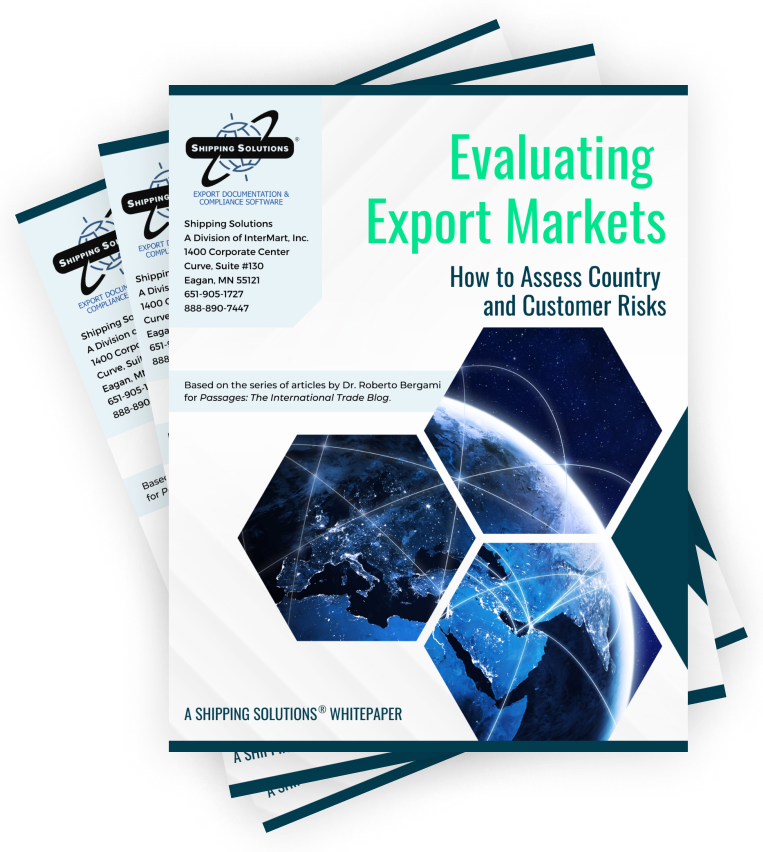The International Trade Blog International Sales & Marketing
Import-Export Due Diligence: Measuring Business Regulations
On: October 18, 2023 | By:  Roberto Bergami |
7 min. read
Roberto Bergami |
7 min. read
 This is the fourth article in my series for exporters and importers on how to assess the risk of doing business with both the relevant country and the particular customer or supplier.
This is the fourth article in my series for exporters and importers on how to assess the risk of doing business with both the relevant country and the particular customer or supplier.
It is important to assess the risks associated with both countries and customers because a rogue customer in a good (from a risk perspective) country is not a much better risk than a good customer in a rogue (from a risk perspective) country.
In this article, I will look at an important new tool: Business Ready (B‑READY), launched by the World Bank in 2024. B‑READY replaces the former Doing Business project and provides a more comprehensive and balanced framework for evaluating the business and investment climate across economies worldwide.
Foreign Government Regulation of Business
I think we have all heard the words: "The job is not complete until all the paperwork has been done."
Bureaucracy, or as I like to refer to it sometimes, bureaucrazy, is one of the banes of business processes. The less paperwork the better. I can almost hear the chorus of supporting voices from the corporate world who would probably wish for nothing better than no controls. Yet controls are needed at all levels and in many different ways to maintain a reasonably fair trading environment for all.
A lack of regulation is a contributing factor in global financial crises; unfair denial of market access; unwarranted duties on products; the spread of disease, drugs and weapons; and many other global issues. Sometimes we resolve these issues by international agreements, other times there are no such instruments to keep everyone honest. I will explore some of these issues in more detail in later articles.
What Is B-READY?
In this article, I will limit the discussion to the macro-level assessment of a country's regulatory regime by concentrating on some aspects of the B-READY project data. Remember that these data are freely available. The report is searchable, or you can download the data.
B‑READY builds on the legacy of Doing Business but addresses its limitations. Instead of focusing narrowly on ease-of-doing-business rankings, B‑READY captures a fuller picture by examining three core pillars:
- Regulatory Framework: The rules firms must follow throughout their lifecycle.
- Public Services: Institutions and infrastructure that support business activities.
- Operational Efficiency: How effectively regulations and services function in practice.
B‑READY evaluates economies across 10 topics that span a firm's lifecycle—from market entry to dispute resolution. Below I explore each topic and how they can help exporters assess country-level risks.
B-READY Categories
1. Business Entry
This category evaluates how easy—or difficult—it is to register and begin operating a limited liability company (LLC) in a foreign country. For exporters, this information is essential if you're considering opening a selling or buying office abroad.
The B‑READY data look at:
- Time and cost to register a business
- Availability of digital public services
- Transparency and accessibility of required information
The regulatory and institutional environment for business entry gives early insights into how bureaucratic or supportive a country is toward new commercial ventures.
2. Business Location
Thinking about a physical investment, such as a factory or test lab? The Business Location category explores the legal and procedural aspects of acquiring, leasing or building property.
This data can help you assess:
- Land ownership restrictions
- Permitting delays
- Regulatory risks tied to construction or local partnerships
For exporters setting up international operations, these factors carry serious cost and risk implications.
3. Utility Services
This topic evaluates the reliability and cost-efficiency of securing essential services—electricity, water and internet.
While this may seem secondary, poor infrastructure can delay operations and increase costs. For instance, frequent power outages or slow internet can stall order fulfillment and weaken your competitiveness.
If your business model depends on local infrastructure, this category should be part of your risk review.
4. Labor
Labor regulations and services directly impact both staffing decisions and compliance burdens.
B‑READY assesses:
- Employment regulations and costs
- Restrictions on hiring/firing
- Access to labor market data and employment services
For exporters entering new markets, understanding the labor landscape is key to planning operations and anticipating potential HR challenges.
5. Financial Services
Formerly limited to credit information, this new category now encompasses:
- Credit transparency: What data is available to assess partner creditworthiness?
- E-payment systems: Are digital transactions fast, reliable and widely used?
- Loan accessibility: How easy is it to get a loan locally to support operations?
- Collateral systems: Can local assets be used effectively to secure credit?
These insights are invaluable for understanding both payment risk and financial flexibility in a foreign market.
6. Market Competition
This is a new addition to the World Bank’s framework. It provides a comprehensive look at a country’s commitment to fair competition and innovation—essential ingredients for a healthy trade environment.
This topic assesses:
- Competition policy and its enforcement
- Intellectual property protections for innovators and exporters
- Innovation support, such as R&D incentives or startup ecosystems
- Transparency in government procurement, which can create or limit opportunities for foreign firms
If you're entering a new market, understanding the competitive landscape is crucial. Are monopolies common? Is favoritism toward domestic companies baked into procurement? A strong market competition framework can lower the risk of anti-competitive practices and make it easier for your company to enter and thrive.
7. Taxation
As Benjamin Franklin famously said, “Nothing is certain except death and taxes.” But in global trade, taxes are far from uniform—and they can dramatically impact your pricing strategy and competitiveness.
While duties are international and generally covered under trade agreements, domestic taxes are entirely at the discretion of the host government. These include:
- Corporate income taxes
- VAT or sales taxes
- Payroll taxes
- Regional or local levies
Exporters often underestimate these costs, especially when selling Ex Works (EXW). But even under EXW terms, if taxes significantly increase the end-user price, you may find your product uncompetitive. Understanding these hidden cost layers is critical when setting pricing and negotiating terms.
Whether you're quoting in a foreign currency, adjusting delivery lead times or choosing an Incoterm, tax implications should be part of your calculations.
8. International Trade
This category is of vital importance to exporters. B‑READY provides granular insight into:
- Time and cost to export/import
- Regulatory quality and border management
- Digital trade readiness, including e-commerce and electronic customs processing
This data allows exporters to pre-calculate logistics timelines, documentation requirements and average customs costs before engaging a supplier or buyer. For example, if a country is known for long customs delays or inconsistent procedures, it may pose unacceptable risks for perishable goods or time-sensitive shipments.
Armed with this knowledge, you can perform preliminary costing, identify potential pain points and negotiate smarter—before even placing a call to a new trading partner.
9. Dispute Resolution
Let’s be honest—no one wants to deal with international litigation. It’s time-consuming, expensive and unpredictable. Yet, contract enforcement is a reality exporters must consider, particularly when extending credit or entering joint ventures.
B‑READY examines:
- Efficiency and transparency of courts
- Length and cost of enforcing a contract
- Regulations supporting commercial dispute resolution
Real-world examples underscore the importance of this category: In some countries, litigation can take years and consume over 30% of the claim’s value in legal costs. That’s a heavy toll on any business.
Even if you plan to avoid litigation, understanding a country’s legal climate can guide you toward using arbitration clauses, letters of credit, or tighter payment terms to protect yourself upfront.
10. Resolving Insolvency
This final category ties closely to credit risk. When things go south—whether due to economic volatility, partner mismanagement or market shocks—you need to know what legal options exist to recover your funds.
B‑READY looks at:
- Regulations around liquidation and reorganization
- Institutional capacity of insolvency bodies
- Time, cost and recovery rates
Recovery rates vary dramatically. In some economies, you may recover 80 cents on the dollar in under a year. In others, you’ll recover just a fraction—if anything—and wait years for the process to conclude.
These insights can influence decisions such as:
- Whether to sell on open account
- Whether to insure receivables
- Whether to insist on prepayment or escrow
By factoring in insolvency data, you get a clearer sense of the true risk of non-payment—and how you can mitigate it before signing the deal.
Final Thoughts
The B‑READY framework gives exporters a smarter, more realistic view of the markets they’re considering. It goes beyond theory to show what doing business is really like—from opening an office, navigating labor law or clearing customs, to resolving a dispute or collecting debt.
In my next article I will look at the level of competitiveness that exists in each country.
Like what you read? Join thousands of exporters and importers who subscribe to Passages: The International Trade Blog. You'll get the latest news and tips for exporters and importers delivered right to your inbox.
This article was first published in August 2013 and has been updated to include current information, links and formatting.

About the Author: Roberto Bergami
A full time member of staff at Victoria University, Melbourne, Australia, since 1998, Roberto holds a PhD (Thesis title Risk Management in Australian Manufacturing Exports: the Case of Letter of Credit to ASEAN), a Master in Education and Master of Business by Research (Applied Economics). Roberto additionally holds the Certified Documentary Credit Specialist qualification.
He is currently a Senior Lecturer in the College of Business and Visiting Professor at the University of South Bohemia in Ceske Budejovice, the Czech Republic. Roberto is also an Associate Researcher of the Centre for Cultural Diversity and Wellbeing and the Centre for Strategic and Economic Studies. Roberto has maintained his involvement with industry through a number of peak associations where he enjoys various grades of senior level membership.
Roberto’s main areas of research interests in international trade focus on government regulations, delivery terms (Incoterms), international payment terms and market entry barriers. His other research interests include the development of communities of practice, online teaching and online communities, migration from Emilia-Romagna (Italy) to Australia and teenage/youth dialect.



